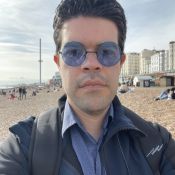

It by far exceeded my expectations!

Have you ever wondered how studying abroad could change your life? In my case, I never imagined the turns that life would take with this decision, but it is a fact that I have reflected on over the years.
Before leaving...
The first important step I took was to attend an Europosgrados fair and there I met my advisor from Across the Pond. This was the turning point: when this dream began to materialize.
In total, the preparation process to study abroad took me a year, during which I:
- Received my degree -the process takes a bit of time in Mexico-;
- Worked full time, which helped me a lot to gain professional experience while allowing me to save a little for my studies;
- Applied to my desired master's degree options;
- Applied to a scholarship which I obtained (so happy!) for the master's degree;
- And as the last step: I carried out the visa process.
In my experience, having an advisor was very helpful because she encouraged me and was an excellent guide, she definitely helped make the process much easier.
Choosing can be difficult!
As an architect, I always knew that I wanted to study something that would allow me to develop projects in a broader context, so initially I was looking for courses related to Urbanism or Landscaping, as usual, life tends to surprise us and adjusts on its own; in the year I was preparing to leave, I had the opportunity to participate in a very important Landscaping project and it helped me be completely sure this is what I wanted to study.
Why did I choose MA in Landscape Architecture at Sheffield University?
There are many reasons why I chose this course, but among the main ones I can mention:
- What most caught my attention was the teaching method. I can highlight the site visits to feel and explore the spaces on site (an essential thing as an architect).
- The lecturers. I love that many of them, in addition to being published authors, have a lot of experience in the field and also work professionally in their area of expertise.
- The fact that it was a two-year course (not the most common in the UK).
- The accreditations of the course.
And I can definitely say that it by far exceeded my expectations!
What sets Sheffield University apart?
Now, it is true that there are several universities that offer studies in Landscape, but the University of Sheffield was the one for me because:
- It is one of the oldest landscape schools in the UK, topping the rankings of the best schools in the world (within the top 100) and the best landscape schools.
- As I mentioned earlier, I found the faculty to be impressive.
- The quality of its educational offer.
- The facilities are very modern and for several years it has been voted by its students as the best "Student's Union".
- There are many renowned alumni, including several Nobel laureates.
- The economic cost of housing (compared to other cities and universities).
- It is the greenest city in the UK (this is very much related to my topic of interest).
- The Peak District.
I loved taking classes in English!
I have to admit that when I started my classes my notes were in Spanglish and with many diagrams, but little by little they evolved to be more in English. When I had to write essays or research, the same thing happened to me: after doing a lot of research, sometimes the ideas came in Spanish, other times in English, and my first draft used to contain two languages.
Eventually, in some moments of daily life, I missed speaking Spanish. Just like now, I miss speaking English.
A normal day as a student
In the day to day at school, I had a fairly defined routine. Get up early, get ready to go to class and walk to school. My house was a 10–15-minute walk to school and it gave me the chance to enjoy at least 3 parks before arriving, this gave me the opportunity of finding surprises along the way, from a blossoming cherry tree to a friend to chat with on the way. Taking public transport is an excellent idea on a snowy or rainy day, since it is super punctual and clean.
I would take classes from 9 am to 5 pm approximately and when we finished, many times my friends and I would meet at the pub. Afterwards, I would return home to do chores, homework or rest.
Also, I had many sleepless nights in the Arts Tower (after approving the necessary trainings) in which we worked on our projects after school. This helped us to socialize a little more, share knowledge and help each other. Also, we used to take a break and go to the Student's Union to relax for an hour or so and have dinner, before continuing with work.
Is education really that different?
Among the things that I loved about the English education system, is that we all had a tutor assigned from the beginning of the course. All tutors get to know their advisees. This tutor is very helpful in case of setbacks, if you have problems at home or something goes in an unexpected way. If you need support, you can always discuss with your tutor the possibilities to follow.
For me, the classes were always very exciting, and I felt that I was learning actively, with a repertoire of real cases and on sites. We would go outside of the classroom to draw, study and experiment. We made scale models with creative techniques and learned different methods of representation. We studied the sites thoroughly and with different perspectives. My master's degree left me with great analytical and representation skills.
In addition, guest speakers were often invited to classes and conferences were held with experts in the field. Even during lunch breaks, small workshops were organized by students about tools that we used every day, these were optional, but extremely useful.
The atmosphere, the facilities, the equipment, everything is top quality. I never thought that I would like to go to work so much or study in a library or simply get together in the workshop with my colleagues to spend an all-nighter.
But not everything is about studying, even in a very demanding course, there is free time and free days to enjoy.
Free time: parks, picnics, trips and more...
England is a place where there is a lot of nightlife, you can find a variety of concerts, visiting djs and music festivals. In Sheffield you can annually enjoy the 'Tramlines' and 'Peace in the Parks', to mention a few.
I loved walking around the city and enjoy its places and architecture. Also, getting together with my friends for picnics or barbecues (especially during summer). As well, we often went to the pub or organized excursions to York, London, Bath, and many other places. We would rent a car, took a bus or train. You can also go to weekend getaways to nearby places or plan a vacation to another part of Europe: my favorite method was to look for cheap plane tickets, oh the surprises I got!
Sheffield is charming and exciting
Sheffield is a student city, so you will find many people who are in a similar situation to you. Whether you're pursuing your bachelor's, master's, or Ph.D., it's easy to meet acquaintances and friends, starting in your classroom or research department.
Among the unique attractions, they have the Paternoster (a kind of elevator that circulates slowly and does not stop) of the Arts Tower which is 1 of the 2 that exist in the world, believe it or not, it is a great attraction and really meets its functions in daily use.
It is a super green city, with many parks in addition to the Peak District. The City Center is very dynamic and beautiful, especially in the winter season when you can enjoy the Christmas Market. They also have a tram, which is used to get to a super large mall with cinemas, bowling, etc.
Another excellent point is that Sheffield has a beautiful train station, it's a great welcome on arrival. It's also near to airports with international destinations: it is only 1 hour by train from Manchester and around 3 hours to London.
Sharing a flat with more students from different grades, what an adventure
In my stay of almost 2.5 years, I always stayed in private accommodation, which I shared with other students. My first flat was shared with 8 people (Wow!) and conveniently located near the university, very close to the best Indian food and an excellent Fish and Chips. I shared the flat with Mexicans, Spanish, South-Koreans and British students, both undergraduates and postgraduates. I won't deny that sharing a home with so many people was a bit challenging, but it was definitely fascinating.
More than expected
When I left my home country, I knew that I was going to get certain things like an excellent education and a little bit of traveling, but definitely among the things that I never imagined I would get from this experience are the great friendships that developed in those years. Today I have created unbreakable bonds with some people who crossed my path.
To keep up to date, I am part of the school's alumni group and there is even a chat for former Mexican students managed by Sheffield University.
Regarding what I did expect, the knowledge I received was wonderful. The tools that my master's degree gave me still help me a lot in my professional life and were perfectly translated to my environment, thanks to the teachings of my professors. Likewise, the experience that living abroad gave me helped me expand the way in which I see and appreciate the world and those who are part of it.
Are you ready?
Did any of what I mentioned sound familiar to you? Did something catch your attention? Do you want to study in UK? If you answered yes to any of these questions, don't hesitate any longer and take the first step in this life-changing experience.
- Veronica

One of the most incredible experiences of my life

A couple of years ago I decided that I wanted to study abroad. Finally, I began the process of deciding where to go and what to study, this process led me to Falmouth, UK, a beautiful town in the south of England. Five months after arriving I can confidently say that this has been one of the most incredible experiences of my life, I have met people from all over the world, visited incredible places, and learned a lot, not only in the master's degree that I am studying at Falmouth University, but also about myself.
Looking back, I would not have been able to get here if I hadn't had the support of Across the Pond, they not only helped me find the university and the master's degree that I wanted but also guided me through the entire application process (a process that was more complicated than I expected), thanks to the infinite patience with which my advisor answered all my questions, I was able to gather my papers, apply and fulfil my dream of studying abroad.
- María José

University life in the United Kingdom is more inclusive

What I liked the most about studying in the UK is the opportunity of having classes in English and sharing this learning experience with people from around the world. In my case, I had classmates from the UK, Turkey, Lebanon, Italy, Nigeria, USA, China, and India. I was the only Mexican and Latin American student of my class, which was an edge because that made me getting out of my comfort zone regarding the language, and that also made me look for friends and academic alliances with my classmates, who also appreciated my qualities and even one of them requested my help as an actor and coaching a Greek actor who had to speak Spanish in the short film he directed. I loved the creative freedom feeling in which my responsibilities and laboral inercia in Mexico did not allow me to dedicate fully to my passion for filmmaking, and of course I am willing to come back as soon as possible.
Why did you choose this university?
I chose the University of Sussex because they have simpler and more inclusive admission terms, compared to other British universities. Moreover, because they offered the program that I was interested in studying, Filmmaking MA, with the learning approach I wanted: a fair amount of theoretical knowledge and practice in various filmmaking departments: scriptwriting, production, production design, casting, actor and camera directing, film festival studies, sound and film editing, visual effects, among others.
Furthermore, my decision was influenced by the fact that Brighton is located on the South East coast of England and it is an hour away from London by train. I would visit London so frequently that it seemed perfectly normal to spend the weekend there.
How do you find university life? How is this different from student life in your home country?
University life in the United Kingdom is more inclusive and broader than in Mexico, from my point of view, since it has student societies with diverse interests: politics, languages, travel, sports, entertainment, cultural backgrounds, religions, countries, and so on. There are also sports courts and gyms in optimal maintenance conditions; student unions that fight for relevant social, political, and academic causes such as lower tuition fees for international students and reduced accommodation costs for everybody, as well as support for teachers’ struggles.
What are you studying and why?
I studied for a Filmmaking MA because being a filmmaker was what I wanted to do since I was a child, but I had not found the opportunity to study it at a postgraduate level. Previously, I had learned scriptwriting with short courses or on my own, and knew a little about production and crew roles, but upon my arrival at the University of Sussex I found that what I knew was insufficient and that I would have to work harder than most of my peers to get the degree. Therefore, I took more than ten online courses and video tutorials. At the end of the Master’s Degree, I dare to say this is just the beginning and that I still have a lot to learn and improve, but I am satisfied about the classes, the practices, and the effort I put into achieving the goal go successfully completing my studies and venturing into the movie making experience.
Describe a typical day as a student/on your course
The nature of my Master’s Degree allowed me to have several types of classes. There were days of totally theoretical classes or lectures in classrooms or in auditoriums. There were also seminar sessions in which we would put tables together and attend classes with a number of readings already read and set to comment, debate, or question. Additionally, I took classes in computer rooms, either to review my classmates’ script development or put editing or crew roles’ lessons into practice at the film studio, where we all organized to make a short film. Finally, there were two classes in cinema theaters. The first one was a lecture given by the director of a local independent cinema in Lewes; and the second one was at a screening at the LGBT Flare Film Festival, sponsored by the BFI.
How is living in the UK different from home?
Living in the UK gave me a very strong feeling of independence and mobility, as public transportation is extremely efficient, organized, and easy to board and pre-pay. The city I lived in, Brighton, has a bus company with an app that allows the user to pay for up to three months of transportation in advance with a special student rate. Similarly, the train nationwide has a mobile app that lets users buy train tickets at a preferential rate and, if they live in the center or south of England, there is a railcard that allows them to make quite cheap trips to different English cities and towns. That made my year in the United Kingdom so memorable because I visited eighty-two towns that combine history, architecture, museums, parks, geographical conditions, and interesting people.
Regarding supermarkets, there are many options that sell local and imported products. As in Mexico, there are products that are more convenient in certain stores, whether for price, quality, and even expiry. Then I recommend to visit all the supermarket chains and local grocery shops to save money with quality optimal food and supplies.
Tell us about the town/city and what you love about it!
Brighton is a city located in East Sussex, on the south coast of England, an hour away from London, arriving at Victoria Station or London Bridge. It is a highly touristic city, with a great student tradition. It receives students from all over the world. That gives the city a welcoming character, where all ideologies and cultures can coexist freely. I never felt misjudged or discriminated because of my background or way of thinking, on the contrary.
On the other hand, Brighton beach has five-centimeter rocks, instead of fine sand, like the Mexican beaches do. However, the seafront is surrounded by local stores and museums that give the city a charming vintage look. In the same way, it is quite pleasant to walk through the lanes, streets with vintage and hipster shops where people can buy antiquities and products with creative designs, unlikely to find in Mexico.
Brighton’s museum have wonderful exhibitions. I highly recommend the Royal Pavilion and the Brighton Museum & Art Gallery.
Tell us about your accommodation
During the term, I lived on the University of Sussex Campus, in Northfield Lane. It is an area that is far from the buildings where classes are held. Northfield is 10 to 20 minutes away on foot, but it as the advantage of being a quiet and relaxing place, with views towards the open field and harmless wildlife such as squirrels, rabbits, crows, and foxes.
What do you do in your spare time?
In my spare time, I used to go out for walk in Brighton seafront and beach or to contemplate the waves of the sea while talking with my friends. I also enjoyed going to a pub to have a cider or a beer and spend time with my friends. It was equally pleasurable to visit British cities and towns that are unusual to appear in tourist guides. Battle, for instance, has a partially ruined abbey and the historical battlefield where King William the Conqueror defeated Harold in 1066. As I said, Brighton is only an hour away from London by train. Then my trips to the capital were quite frequent.
If English is not your first language, how did you find the transition into studying in English?
First I was a little shy about participating in class and interacting with my peers. I felt strange, without friends and with the culture shock of being surrounded by people from different backgrounds. However, during the second term, there were activities like making a movie all together and the film festival studies subject that helped me gain confidence to be more participatory and contribute both with knowledge, creative, and physical work. I realize that I had a lot to give and receive. By the end of the course, I think I managed to adapt well to the dynamics of a practical Master’s Degree and to my classmates. It was a more than significant and fun experience that left an indelible print in my personal life and professional career.
Is there anything else you'd have liked to know before you applied, started university or went to the UK?
I think I got well prepared and informed about the course, the autonomous way of learning, studying, and working in the universities from the United Kingdom. Moreover, the living expenses before getting there. Although I do recommend to listen to the advice to carry little luggage, because the clothes I got in Mexico were not very useful when I was in the UK, particularly in winter. The weather is truly changeable, from cold and rainy to sunny but windy throughout the day.
On the other hand, the exchange rate from Mexican Peso to Sterling Pound and Euros ended up benefiting me because the British and the European currencies have gone down and the Mexican Peso has strengthen remarkably.
- Victor






